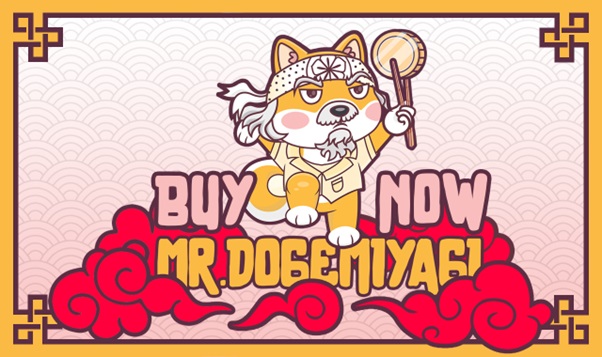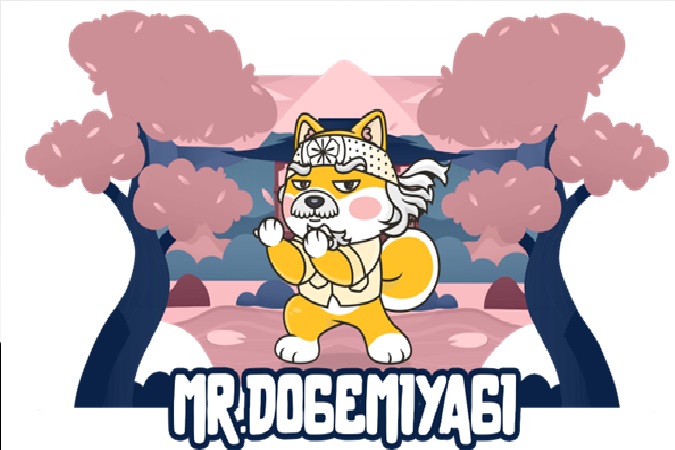
In order to empower users, build confidence, and support democratic decision-making, decentralization is a fundamental principle of the crypto sphere. What sets DogeMiyagi(MIYAGI) apart isn’t just its catchy name; it’s the transition to a Decentralized Autonomous Organization (DAO) and the unique governance. Solana (SOL), the high-performance blockchain network, and Ethereum (ETH), the ground-breaking smart contract platform but 2500 ETH burns is a notable event, as it contributes to the overall reduction of Ethereum’s circulating supply, potentially impacting its scarcity and value over time.
However, as Ethereum experiences notable market activity with the recent 2500 ETH Burns, an alternative contender steps into the limelight – DogeMiyagi. In this comparative article, we delve into the intricacies of these three entities, exploring the benefits of decentralized decision-making within the DogeMiyagi ecosystem, and offering a fresh perspective on project development in the world of fintech.
Ethereum: Pioneering the Smart Contract Revolution
Ethereum, often referred to as the “world computer,” laid the foundation for decentralized applications and smart contracts. Launched in 2015 by Vitalik Buterin, Ethereum introduced a groundbreaking concept that extended beyond mere transactions. The Ethereum market has been experiencing significant movement lately, driven in part by the 2500 ETH burns. Smart contracts, self-executing agreements with terms directly written into code, brought a new dimension to blockchain technology. 2500 ETH burns involves sending it to an address where it becomes unspendable, effectively reducing the total supply of Ethereum in circulation.
Ethereum’s governance primarily relies on a community-driven approach. Decisions are proposed and discussed within the Ethereum Improvement Proposal (EIP) process, where participants debate changes, improvements, and upgrades to the network. Ethereum’s transition to Ethereum 2.0 further underscores its unwavering commitment to decentralization. This move involves shifting from a proof-of-work (PoW) to a proof-of-stake (PoS) consensus mechanism, empowering token holders to take a more proactive role in the network’s decision-making processes.
Solana: Speeding Up Blockchain Transactions

Solana, a relatively newer player in the blockchain ecosystem, differentiates itself with its remarkable transaction speeds and scalability. Solana was designed to address the scalability issues faced by many other blockchains, leveraging a unique consensus mechanism known as “Proof of History” (PoH) alongside PoS. This combination enables Solana to process thousands of transactions per second without compromising on security.
Solana’s governance model, similar to Ethereum’s, encourages community involvement. Proposals for protocol upgrades and changes are submitted through the Solana Improvement Proposal (SIP) process. Community members and validators collaborate to assess and vote on these proposals, ensuring a collective voice guides the platform’s evolution.
DogeMiyagi: From Meme to DAO Empowerment
DogeMiyagi, often celebrated as a top new memecoin, has captured the attention of the crypto community with its playful yet purposeful approach. Beyond the humor, DogeMiyagi is making a profound shift by transitioning to a DAO. This transition empowers its community members to actively participate in decision-making processes, aligning with the broader theme of decentralization within the crypto space.
At the core of DogeMiyagi’s model is decentralized decision-making. Through its DAO structure, token holders are granted voting power on important matters, such as project development, partnerships, and even meme contests. This approach ensures that the community’s collective wisdom shapes the project’s trajectory, reducing centralized control and fostering a sense of ownership among members.

Final Words
In the realm of cryptocurrency and fintech, Ethereum and Solana have paved the way for blockchain innovation, each with its unique strengths. However, the emergence of DogeMiyagi and its transition to a DAO introduces a novel approach that emphasizes community empowerment and inclusivity.The 2500 ETH burns is a notable event, as it contributes to the overall reduction of Ethereum’s circulating supply, potentially impacting its scarcity and value over time. As the fintech landscape continues to evolve, the concept of DAOs and decentralized decision-making could become a cornerstone, enabling projects like DogeMiyagi to stand out as leaders in the crypto market.
Be a part of this groundbreaking movement, and consider joining the DogeMiyagi presale—an opportunity to contribute to a network poised to lead the crypto market with its innovative approach.
Find out more about DogeMiyagi (MIYAGI):
Website: https://dogemiyagi.com
Twitter: https://twitter.com/_Dogemiyagi_
Telegram: https://t.me/dogemiyagi

